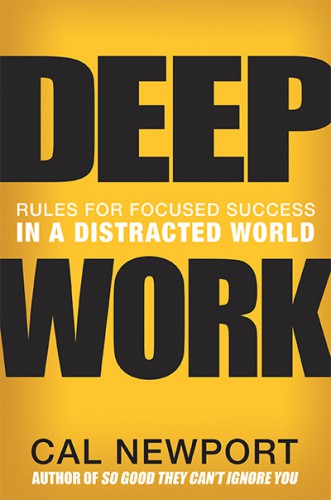 NEWPORT’S BOLD COVER CONVEYS brilliance found within.
NEWPORT’S BOLD COVER CONVEYS brilliance found within.“To be everywhere is to be nowhere,” wrote Seneca in one of his famous Letters from a Stoic. Warren Buffett, Steve Jobs, and Bill Gates, when asked about what trait they most attribute their success to, all gave the same answer: focus.
In Deep Work, Georgetown professor and author Cal Newport presents a compelling argument for what he calls “deep work” and offers actionable advice for cultivating it in our own working lives.
The following describes Deep Work according to Newport: “Deep Work: Professional activities performed in a state of distraction-free concentration that push your cognitive capabilities to their limit. These efforts create new value, improve your skills, and are hard to replicate.”
Newport cites the influential 2011 book Race Against the Machine and argues that the rise of digital technologies is bringing about a new economy, one where “the talent market is made universally accessible, [and] those at the peak of the market thrive, while the rest suffer.” He further says that to thrive in the new economy, there are two core abilities one must possess—”The ability to quickly master hard things [and] the ability to produce at an elite level, in terms of both quality and speed.” Both of these skills are built upon the ability to intensely focus on the task in front of you — in other words, both require deep work.
So how can one start developing this skill? Newport argues, “the key to developing a deep work habit is to… add rituals to your working life designed to minimize the amount of your limited willpower necessary to transition into and maintain a state of unbroken concentration.”
Out of the four working philosophies presented, the one most easily adapted to by students is what Newport calls the “rhythmic philosophy of deep work… The easiest way to consistently start deep work sessions is to transform them into a simple regular habit.” One such way to do this is to deliberately practice intense concentration: choose a high priority, cognitively demanding task (aka a “deep task”), estimate how long it would normally take, set a new deadline that is significantly less, and try to complete the task in the time allotted. Newport recommends starting with just one of these sessions a week and then increasing the frequency once you are comfortable with trading concentration for completion time.
To aid in cultivating more and deeper work, Newport borrows a framework from The 4 Disciplines of Execution. The first discipline tells us to apply deep work to just a few “wildly important” tasks. As Confucius said, “He who chases two rabbits catches none. Find the one or two things that would make the most impact and cut out everything else.”
“What gets measured, gets managed” is a famous quote by Peter Drucker for a reason. Track the number of hours you work deeply for and keep a public, physical scoreboard in your workplace.
The last discipline to hold yourself accountable: review weekly how many hours you worked deeply, “celebrate good weeks… understand what led to bad weeks… and figure out how to ensure a good score for the days ahead.”
The last chapters are dedicated to providing actionable steps you can take to work more deeply. Some of the more notable ones are entirely quitting social media, turning off your phone during the day, and not doing any work after 5:30 pm. While these may seem crazy for today’s world—at least one certainly is; I can’t find much benefit in memorizing a deck of cards—not all of them need to be done to reap the benefits of deep work. Test them yourself one at a time and you’ll be well on your way to producing better results in less time.
The above has just been a nibble of all that Deep Work has to offer. It is poised to become one of the most sought after skills in the near future and you’ll be doing yourself a disservice by not reading a copy of this original and compelling book.
